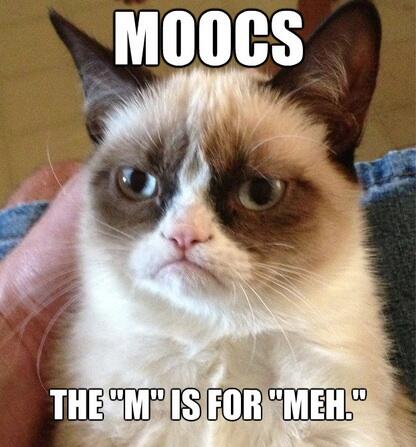Every time I turn around, there are more good/interesting MOOC articles to post about/write about, but since I am already behind in getting this post up and running, those new articles will have to wait until I post again later this week. But before I get to some thoughts on week one of “English Composition 1: Achieving Expertise,” which is a Coursera MOOC by Duke’s Denise Comer (and a cast of others in various support roles), a bit of a link round-up in MOOC news that I thought was interesting:
- A whole different/similar thing is happening “down under” with an Australian MOOC Platform.
- “Who Owns a MOOC?” From Inside Higher Ed, this is about how these Coursera courses might figure into collective bargaining issues and issues of who owns the content of courses. What this article says and what I’ve heard before is the faculty doing these courses are essentially giving away their content and time: that is, Coursera has contracts with universities and not professors, and so the extent to which faculty are beging compensated for this work depends entirely on the institution, and from what I can tell from what I’ve read, most faculty are doing this MOOC thing as an overload because
vanity? ego?they want to participate in a new and interesting experiment, or, in the case of Comer’s MOOC, research (see below).
California is a complicated place when it comes to MOOCs since we’re seeing them roll out there as experiments, which obviously has a lot of people nervous. But as I understand it, one of the more unique situations in California is you’ve got thousands and thousands of students out there who can’t even get into the community college system because the classes are full and the waiting lists are long. In other words, MOOCs aren’t the immediate threat that they would be if EMU started taking that credit. At least I don’t think so.
- Along these lines regarding California and MOOCs: “A Massively Bad Idea” by Rob Jenkins in CHE, which points out clearly and calmly the simple facts that MOOCs (and online classes, for that matter) are not a good idea for “remedial” classes and/or “underprepared” students.
- “SXSWedu: A MOOC Love Fest,” which reports on a keynote panel that featured Andrew Ng, edX’s Anant Agarwal, and some of the other usual MOOC suspects. A lot of self-congratulations here, basically.
- “The Professors Who Make the MOOCs” by Steve Kolowich at CHE. It’s the results of a survey of some of the faculty who have taught MOOCs, and as is typical of surveys like this, the results seem contradictory. On the one hand, in response to the question “Do you believe MOOCs could eventually reduce the cost of attaining a college degree in general?” 45% said “yes, significantly” and 41% said “yes, marginally.” On the other hand, 72% of those surveyed did not think the course deserved “formal credit” at their institutions and 66% didn’t think their institutions would be granting credit for MOOCs either. So how does a course that doesn’t lead to credit help lower the costs of higher education?
- But it would appear that a lot of the mainstream media is (slowly but surly) starting to raise some questions about MOOCs as being the solution to everything. For example, there’s “Open web courses are massively overhyped” by Michael Skapinker from the UK’s Financial Times (with an annoying login process). The basic three reasons he says MOOCs are overhyped:
- “What students learn is less important than where they learnt (or didn’t learn) it.” That’s spot-on, IMO, which is why the pecking order in higher education is still alive and well.
- “It is difficult to concentrate on a video lecture.” Maybe. It’s difficult to concentrate on a badly produced/delivered lecture, especially if that lecture is nothing more than a talking head.
- “The number of people who attend lectures in person is growing.” And here he’s talking about speakers at festivals and such. I don’t exactly see the connection to MOOCs or regular teaching, but whatever.
- I’m not sure how I came across this, but from Quartz comes “The dirty little secret of online learning: Students are bored and dropping out” by Todd Tauber. It more or less covers a lot of familiar territory but it’s worth taking a look at even if you’ve been down this MOOC road already because he has a boatload of good links in this piece.
- Finally I stumbled across it via Stephen Downes: as far as I can tell, Laura Gibbs is already offering some pretty solid feedback and critiques of Duke’s English 1 course, here so far. There’s a Google+ community for the class that I just joined, too; though since I don’t do a whole lot with Google +, I don’t know how active I am likely to be in said community.
Okay, on to Duke’s English Composition 1:

